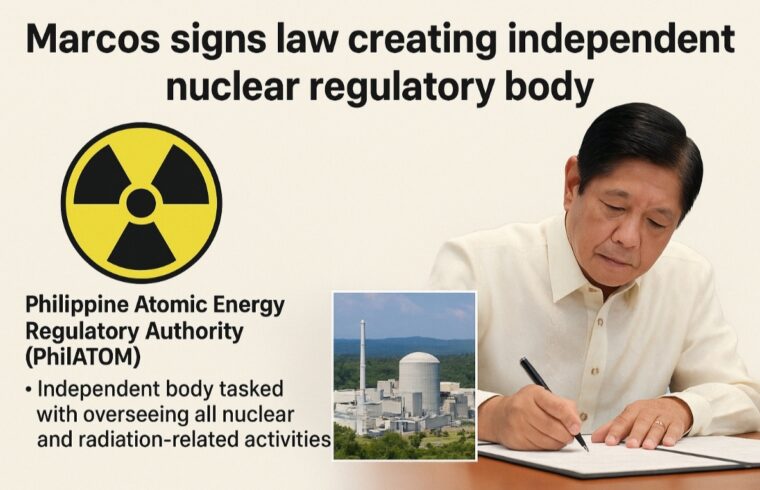President Ferdinand Marcos Jr. has signed into law a measure establishing the Philippine Atomic Energy Regulatory Authority (PhilATOM), an independent body tasked with overseeing all nuclear and radiation-related activities in the country, a key requirement for the possible use of nuclear power.
The Philippine National Nuclear Energy Safety Act, also known as the PhilATOM law, was enacted on September 18, months after its ratification by Congress. The new authority will regulate all sources of ionizing radiation — from nuclear power plants to medical and industrial devices — and will enforce international standards on safety, security, and safeguards.
“This legislation aligns the nuclear regulation in the Philippines with international standards, and satisfies a main requirement of potential nuclear power operators to have an independent regulatory body,” said Philippine Nuclear Research Institute (PNRI) director, Dr. Carlo Arcilla.
“The passing of the PhilATOM bill will help usher the integration of nuclear power in the Philippine energy mix, helping provide dependable baseload and reliable electricity to consumers and the industry,” he added.
The law separates regulatory functions from the Department of Science and Technology’s (DOST) Philippine Nuclear Research Institute, which previously handled both research and regulation. It also consolidates the mandate of the Food and Drug Administration’s (FDA) Center for Device Regulation, Radiation Health and Research, which oversees x-ray machines, accelerators, and similar devices.
By unifying oversight under PhilATOM, officials said the measure will streamline regulation and improve protection for workers, patients, the public, and the environment. It also adds provisions on radiation protection, nuclear emergency response, and compliance with international treaties and conventions under the International Atomic Energy Agency.
DOST Secretary Renato Solidum Jr. called the enactment “yet another of the landmark measures that we at the Department of Science and Technology have been pushing to address many of the pressing issues in our S&T landscape,” adding that PhilATOM will regulate applications of nuclear science in health, agriculture, and industry, aside from power generation.
The measure had been pending in Congress for nearly two decades. In November 2023, 200 House members approved House Bill 9293, spearheaded by Rep. Mark Cojuangco, chair of the House Special Committee on Nuclear Energy. In 2025, the Senate passed its counterpart bill, sponsored by Sen. Alan Peter Cayetano, chair of the Senate Committee on Science and Technology. Both chambers ratified the conference committee report in June, and the measure was transmitted to Malacañang in August.
“We thank the great efforts of PNRI, FDA, DOST, DOE (Department of Energy), and Congressional staff of both houses who spent many hours crafting the bill, which has been pending for almost 20 years,” Arcilla said.











